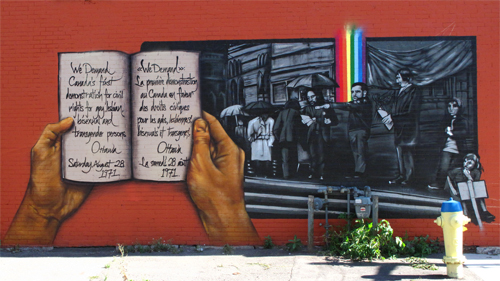Capital Pride wrapped up a “very successful” 2011 edition last week with its parade through Ottawa’s downtown core, drawing an estimated 55,000 to 60,000 people, according to its chair Doug Saunders.
Capital Pride maybe the preeminent event for the city’s GLBTTQ community, but it’s also gradually becoming one of Ottawa’s largest and most popular festivals. This year’s version featured over 55 events, 100 volunteers and saw an increase of 200-300 per cent in advertising sales over the previous year.
Last week, city Councillor Diane Holmes hung up street signs branded “The Village” in a downtown intersection as part of a poll of local residents and businesses about designating a collection of streets in the city’s Centretown region “a gay-friendly village.”
The advocacy group spearheading these efforts, also called The Village, encourages local businesses in the proposed area to fly the Pride flag and display proud to support the Village signs in their storefronts.
In addition, activists have been using public art projects to display the GLBTTQ community’s cultural contributions to the area, including an installation of quotes by Oscar Wilde and a painted mural of the monumental 1971 gay rights We Demand rally on Parliament Hill, according to the Village chair Glenn Crawford.
The recognition of a gay-friendly village is opposed by the Bank Street Business Improvement Area (BIA), a group representing local area businesses. Crawford cites concerns about scaring off heterosexual consumers and complaints about the village as being unnecessary as the top criticisms launched against the proposal.
However, Wendy (aka Dorothy), the owner/founder of Dorothy’s Closet, an online portal for everything from restaurants to local businesses for the GLBTTQ community, says a gay-friendly village is important as it provides a sense of security, tolerance and acceptance.
“Going to Church street in Toronto and Catherine street in Montreal and being able to pin point an area that I could be welcomed as a gay person is very important,” says Wendy, “an area I can be understood, and showcase myself.”
Despite the opposition, Noreen Fagan, the managing editor of the city’s gay and lesbian newspaper Xtra Ottawa, believes the Village is inevitable.
“Most people I have spoken to — members of the community, residents in the area, municipal, provincial and federal politicians — feel that the village is a given,” says Fagan, “the area is referred to as The Village, all it needs is the official recognition.”
This debate shows there is still more to be done for the GLBTTQ community.
“There have been great leaps, even in the last 10 years towards greater awareness and understanding, but we’re not done,” says Claudia Van den Heuvel executive director of Pink Triangle Services, which provides a range of social services for the local GLBTTQ community.
“Pursuit of our rights has brought the Queer community to the point of tolerance by most of mainstream society — but that is not enough. All marginalized communities should be celebrated and respected for their contribution to our cultural fabric,” adds Van den Heuvel.
Ernie Gibbs, a mental health counsellor for GLBTTQ youth at the Centretown Community Health Center (CCHC), notes that the community has unique challenges, specifically citing the higher suicide risks of GLBTTQ youth and the concerns of elderly community members that they will have to hide their sexual orientation as they began to require more medical attention.
The CCHC runs a diverse program for the GLBTTQ community ranging from the SAGE support group for community members 40 and older to the Gay Zone group which provides medical information and services for men who have sex with men.
However there is still a decidedly political element to the community’s lobbying effort as witnessed by last week’s We Still Demand rally on Parliament Hill. The rally was designed to showcase that even after the successes of marriage equality and anti-discrimination legislation, the GLBTTQ community needs to continue its activism.
Crawford, who addressed the rally, cites discrimination, the lack of rights for the Trans community, the ban on gay men to give blood, the persecution of sex industry workers, and concerns over HIV criminalization as some of the most pressing issues facing the community.
“They are still many social issues our community faces,” says Crawford. “As we continue to face threats and inequities there is a need not to create a ghetto where we are isolating ourselves but a place where we can gather. There is still a need to build our community.”
Marco Vigliotti is an Ottawa-based freelance journalist.
Image: Local artist Dan Metcalfe and Robbie Lariviere, have dedicated this huge mural to remember Ottawa Pride 2011. Photo courtesy of Busted Limb.



